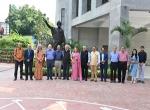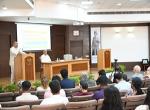While freebies are considered among the surest and fastest means of providing succor to the needy poor, these come at a heavy cost to the national exchequer, as precious economic resources have to be diverted away from developmental projects, especially those linked to infrastructure projects.
The dichotomy in meeting the objectives of a welfare state which also aspires to move up the index of socio-economic development was explained lucidly by one of India’s most accomplished public administrators, Mr. BP Singh, former Governor of Sikkim and Home Secretary to the Government of India. He was speaking at a public event, organised by the Vivekananda International Foundation (VIF), New Delhi, on Aug 17th 2016. The talk was a part of the Foundation’s ‘Vimarsha’ series of monthly lectures delivered by persons of eminence on issues of contemporary national importance, that is followed up with free exchange of thoughts among the equally distinguished participants.
 In his opening remarks, certain representative cases of distortions to the fundamentals of ‘good governance’, that the nation has had the morbidity to suffer over the years, were highlighted by General NC Vij, Director, VIF. He suggested that among many hurdles against good governance, a lack of trust between the bureaucracy and the political class was one that often led to serious policy logjams in the past. That trust deficit led to a situation when bureaucrats lived under threat of being hauled up for taking well intentioned decisions, even after their retirement. It was therefore necessary in the best interests of the nation that an upright bureaucracy be made to feel secure and confident in making decisions in the best interests of the country. The Director lauded Prime Minister Mr. Narendra Modi for propagating the mantra of ‘Citizen First’ which should guide both the bureaucracy and the political class towards a reign of good governance in India.
In his opening remarks, certain representative cases of distortions to the fundamentals of ‘good governance’, that the nation has had the morbidity to suffer over the years, were highlighted by General NC Vij, Director, VIF. He suggested that among many hurdles against good governance, a lack of trust between the bureaucracy and the political class was one that often led to serious policy logjams in the past. That trust deficit led to a situation when bureaucrats lived under threat of being hauled up for taking well intentioned decisions, even after their retirement. It was therefore necessary in the best interests of the nation that an upright bureaucracy be made to feel secure and confident in making decisions in the best interests of the country. The Director lauded Prime Minister Mr. Narendra Modi for propagating the mantra of ‘Citizen First’ which should guide both the bureaucracy and the political class towards a reign of good governance in India.
While dwelling upon the objectives of a welfare state and quoting from the Indian Constitution, Mr. BP Singh underscored the ideal that resources of the state have to be utilised in a manner that benefits the interests of larger sections of the society, rather than bringing wealth to just few individuals. He cautioned that denying to the poor the right to live with dignity might eventually put India’s entire political system in peril.
Making a distinction between good and bad freebies, Mr. BP Singh opined that these were appropriate to the extent till these remained aligned to the development schemes and with the purpose of assisting the marginal sections of the society to rise.
 Contrarily, the speaker said, freebies doled out as electoral gifts in order to boost the image of a particular political party or to buttress the ego of certain political leaders actually land up creating social and cultural problems. What was stated to be even more worrisome was that in India the distinction between a welfare state and short-term political populism was getting increasingly blurred as more and more political parties had been dispensing freebies as an easy way to capture state power.
Contrarily, the speaker said, freebies doled out as electoral gifts in order to boost the image of a particular political party or to buttress the ego of certain political leaders actually land up creating social and cultural problems. What was stated to be even more worrisome was that in India the distinction between a welfare state and short-term political populism was getting increasingly blurred as more and more political parties had been dispensing freebies as an easy way to capture state power.
Mr Singh pointed out that with the spread of awareness, effects of globalisation and mushrooming of firebrand detractors - among many other reasons - people’s aspirations have been rising even beyond the limits of practicability’s. Governance in India was therefore getting increasingly complex and challenging. Sharing his insight, the speaker then went on to offer a ten-point agenda for good governance, including, among others, decentralisation of power, institution of various development schemes down to the grassroots levels, improving the quality of education, accountability of various agencies and transparency in implementation of schemes. He also suggested the creation of mechanisms to protect the honour and dignity of honest bureaucrats and executives for them to serve free of reservations.
Mr. BP Singh’s talk on freebies and good governance generated considerable interest among the audience, as it was videnced by the volley of questions thrown at him, and well considered answers from the speaker.






